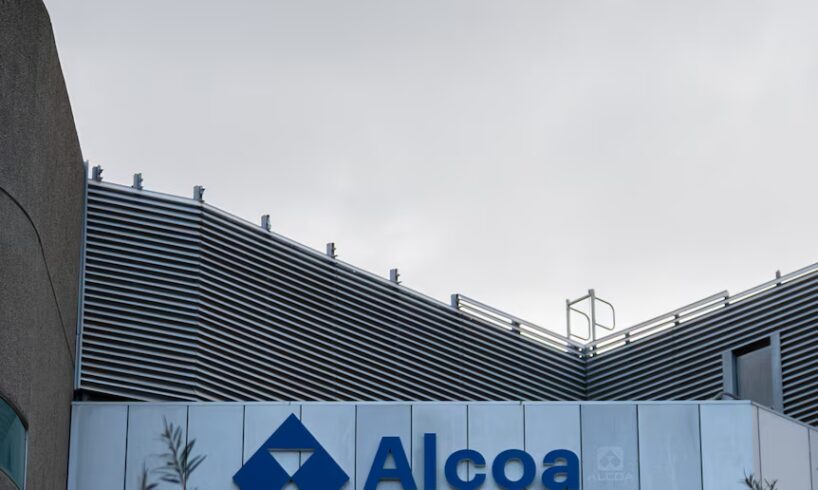
Western Australia’s slice of the $13 billion US–Australia critical minerals deal is being heralded as a huge win, but critics are questioning how much US aluminium giant Alcoa’s boon will benefit Western Australians.
Pennsylvania-based Alcoa and a rare earths project backed by Australia’s richest woman, Gina Rinehart, will be the first beneficiaries of the bilateral deal, with a pipeline of other projects also earmarked for funding, including Northern Minerals’ WA rare earths project.
Alcoa’s slice of the funding will help develop a gallium refinery south of Perth. (Commons: Foobar; Gallium crystals; licence)
Alcoa’s funding will go towards developing a gallium refinery in Wagerup, about 120 kilometres south of Perth.
The company has mined among the world’s only jarrah forests in WA since the 1960s, and has two expansion proposals before the state’s Environment Protection Authority (EPA).
EPA chair Darren Walsh said gallium processing and extraction were not part of the Alcoa assessments currently before the authority.
‘Alcoa is here to stay’
University of Western Australia associate professor Kirsten Martinus said the funding deal cemented Alcoa’s presence in WA.
“I think their presence may have been a bit shaky before because there’s been a lot of talk around the shutting down of refineries, and because of their environmental track record,” Dr Martinus said.
The EPA has received almost 60,000 public submissions related to Alcoa’s proposal to expand its operations. (ABC News: Cason Ho)
“The fact that Alcoa is the first one off the rank cements the fact that Alcoa is here to stay.”
The EPA received a record 59,000 public submissions regarding Alcoa’s proposal to expand its mining operations.
The company has faced local backlash due to water safety concerns, impacts on at-risk species, and issues with rehabilitating the forest it mines.
In a statement, Alcoa COO Matt Reed said the gallium project was unrelated to the EPA’s assessment and the company was committed to “responsibly mining bauxite” used to create alumina and gallium.
“Regarding the workforce at the Kwinana refinery, our people are our number one priority, as we believe we’ve demonstrated throughout the curtailment process,” he said.
Timing questioned
How we use critical minerals
Waroona Shire president Mike Walmsley said it was strange timing for Alcoa to receive funding for its Wagerup refinery, as the project could hinge on the outcome of the EPA’s review.
“I don’t think there will be a halt to [Alcoa’s operations] entirely, but there may be some more stringent conditions around their operations in the Northern Jarrah Forest,” he said.
“I guess it adds weight to their business case if they’re getting more minerals out of it, and the economic development that it brings perhaps adds weight to the ability to keep doing what they’re doing.”
Alcoa’s mining footprint in WA between 1984 and 2022. (Supplied: Google Earth)
Alcoa is exempt from most of the state’s environmental legislation and is instead governed under state agreements, which are approved by the minister for state and industry development.
Mr Walmsley hoped the company’s expanded operations would bring jobs to the region, something WA Premier Roger Cook said would be the case while heralding the bilateral funding deal.
“It means more local jobs from the gallium project down near Wagerup in Western Australia … these are exciting days,” Mr Cook said on Tuesday.
Who will benefit?
Part of the intent of the US–Australia critical minerals framework is to break China’s dominance in the sector.
Dr Martinus said it had the potential to diversify WA’s economy from a simple mining state.
Kirsten Martinus says the deal will help WA to diversify its mining-reliant economy. (ABC News: Chris Lewis)
“Processing and going downstream is not exactly where our strengths have been. And even recently, we’ve had several refineries shut down,” she said.
Albanese and Trump ink deal for ‘dominance’ of critical minerals
“But it’s really important that we’re not just selling our minerals offshore, and so the opportunity to process and to do refining is a really key step in terms of diversification.”
Dr Martinus said it was important that benefits to projects in WA flowed on to Western Australians.
“If you’ve got development of intellectual property, which will happen because you’re going into new refining processes, that will be kept by the company,” she said.
“If that’s Alcoa, then that obviously enriches an American company and not the Australian companies.
“We’re looking at supporting Australia in building sovereign capability, so it shouldn’t just be for the purposes of the global critical mineral demand.”
The Chamber of Minerals and Energy of Western Australia’s director of policy and advocacy, Anita Logiudice, hoped local economies would benefit.
“This [agreement] sends a really strong signal that the US government and possibly other partners are willing to enter into contracts containing floor prices above current market value,” she said.
“That money then flows into those local economies and communities and continues to flow throughout the WA economy.”
Loading
Source





